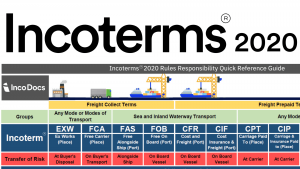It happens, if we want it or not! Goods get lost or damaged during transport, be it by air, sea, road or rail. What happens if they do and no transport insurance has been taken out? The financial losses can be devastating, not to speak about the loss of customers.
Not only may damage to cargo cause severe financial losses and unhappy customers, it may also result in the image of the seller taking a knock.
Whereas no transport insurance will cover “consequential losses”, unless a particular arrangement is made with the underwriter on a specific project, the damages to the seller and buyer should be kept to an absolute minimum. This can be achieved by taking out transport insurance.
So, what should be considered when taking out transport Insurance?
1. What does Marine Insurance cover?
Marine Insurance covers the physical loss and damages to cargo on all movement of goods by air, sea, road and rail. This also takes the principle of “General Average” into account.
2. What is excluded from Marine insurance?
- Exclusions as per “Institute Cargo Clauses” (Ask us for further information)
- Consequential losses
- Penalties, liabilities, loss of market
- Inevitable losses (not unforeseen risk)
3. What is “General Average”?
The law of general average is a legal principle of maritime law according to which all parties in a sea venture proportionally share any losses resulting from a voluntary sacrifice of part of the ship or cargo to save the whole, especially crew, in an emergency. This means that, in order to save the crew, vessel and cargo, certain costs occur which are divided by a key amongst the shippers. If no marine insurance is covered, the individual shipper will have to pay out of his own pocket to get his cargo released.
4. What is the basis for insurance purposes (The insured value)?
It is very important to meet the individual needs when it comes to determining the sum insured of the cargo.
Insuring the cost of the goods only means nothing else but that you are only going to be paid the cost of the goods less the excess, when a claim occurs.
But there are other costs to consider, such as freight charges, duties etc. Make sure to discuss these with Novotrans so that you have adequate insurance cover.
For example:
| Imports: | Total delivered cost plus a mark-up of 15% | |
| Exports: | CIP/CIF value as per sellers invoice plus 10%, or as per letter of credit, or as per sales contract. | |
| Inland: | Selling price as per sellers’ invoice including all ancillary cost incurred such as transport. | |
Implementing the above may well save you a lot of headache and grief, unhappy customers and financial losses. Considering the low premiums involved, it is definitely a worthwhile piece of mind.




